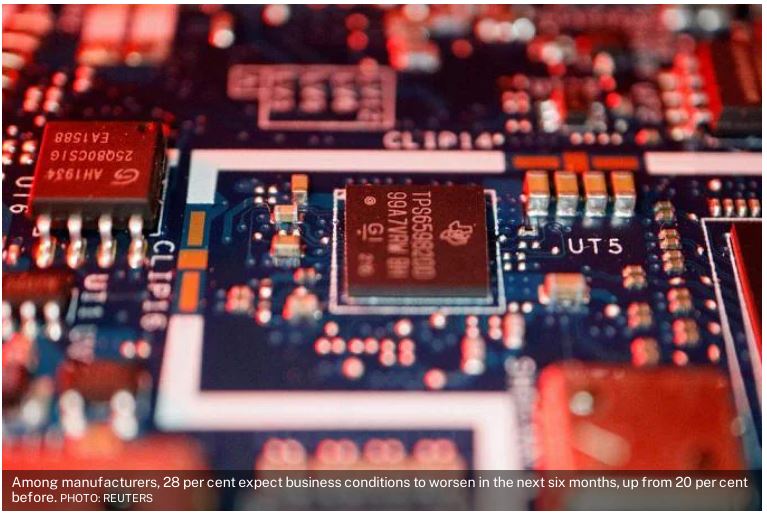Singapore: Manufacturing expectations still pessimistic, services sector less upbeat: surveys
SINGAPORE’S manufacturers remain negative about business conditions in the next six months, while services firms were less positive, according to separate quarterly surveys on Monday (Oct 31).
A net weighted balance of 20 per cent of manufacturers expect a less favourable business situation October 2022 to March 2023, worsening from the previous quarterly survey, where 8 per cent were pessimistic, according to the latest release from the Economic Development Board (EDB).
OCBC chief economist Selena Ling noted that the latest print is “the weakest reading since the -56 per cent seen back at the peak of the Covid pandemic in March 2020”.
EDB flagged supply chain challenges and operational cost pressures amid the Russia-Ukraine conflict and Covid measures in China, as well as weaker macroeconomic conditions as factors weighing on demand.
Maybank analyst Chua Hak Bin added: “The worsening business sentiments for manufacturing is in line with the deterioration in electronics production, especially for semiconductors.”
For services firms, a net weighted balance of 9 per cent are optimistic, down from 15 per cent previously, found a similar survey by the Department of Statistics (Singstat).
The net weighted balance is the difference between the weighted shares of positive and negative responses, with a positive figure indicating more optimism than pessimism.
Among manufacturers, a weighted 8 per cent expected improved conditions ahead, down from 12 per cent in the previous survey. Comparatively, 28 per cent expected conditions to worsen, up from 20 per cent before.
Most clusters were pessimistic about business conditions in the next six months, with transport engineering being the only sector to expect a more favourable business environment.
Business sentiments in the precision engineering cluster turned negative, compared with 11 per cent being optimistic in the last quarter, as the economic climate deteriorates and cost of operations continue to rise. The negativity was led by the machinery and systems segment (-41 per cent).
The electronics cluster was the gloomiest, with rapidly softening demand in the semiconductors and computer peripherals and data storage segments, especially from PC and smartphone markets.
“With the potential for escalation in the US technology export ban on China, this could be the proverbial needle that breaks the camel’s back for the semiconductor-related equipment industry,” said Ling.
The transport engineering cluster was the only optimistic cluster, though it was down from the previous survey (48 per cent). The aerospace segment expects higher demand for aircraft maintenance, repair and overhaul, while the land transport segment expects a better supply of automotive components from vendors.
Similar to the six-month outlook, most of the manufacturing clusters expect output to fall in the immediate next three months, led by electronics. In contrast, transport engineering and general manufacturing expect boosts to production.
In terms of employment, the majority of clusters expect to hire more workers, except for biomedical manufacturing and electronics.
In the services industry, the net weighted balance of firms expecting more favourable business conditions was lower than the same period last year (19 per cent) and the lowest since Q4 2020 (7 per cent), but “remains a far cry from the depths of” March 2020’s -58 per cent, said Ling.
In this quarter’s survey, 23 per cent are more upbeat, while 14 per cent foresee deteriorating business conditions.
Most industries expect improved business conditions in the October to March period, on the back of more tourist arrivals, an increase in events and the year-end festive season. But the wholesale trade and real estate industries forecast dimmer business conditions ahead.
Wholesalers of computers, computer peripheral equipment and software attribute negative sentiment to declining demand for computers; real estate developers and agents flag the latest government property cooling measures and rising interest rates.
With a net weighted balance of 8 per cent of firms, the services sector foresees higher revenue for the October to December period compared with July to September, said Singstat. In terms of employment, the services sector expects an increase in hiring activity for the period, with a net weighted balance of 15 per cent.
Firms within the accommodation industry expect to increase hiring to keep pace with higher business activities arising from the increase in tourist arrivals, Singstat noted.
Chua expects job growth to diverge and become more uneven across sectors. “There might be job losses in manufacturing and trade-related services but job gains in the hospitality, retail and aviation sectors where the reopening continues to support growth,” he said.
Ling added: “This latest business expectations surveys clearly illustrates that the Singapore economy will not be immune to the current global economic and geopolitical headwinds, but as the services sectors takes over the mantle from manufacturing to do more of the heavy lifting from here, there may be greater dependence on the ongoing health of the local job market and in turn domestic and regional consumer demand.”
Source: https://www.businesstimes.com.sg/government-economy/mobile-spotlight/manufacturing-expectations-still-pessimistic-services-sector


 English
English




